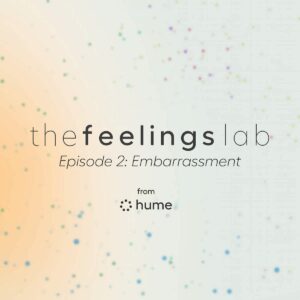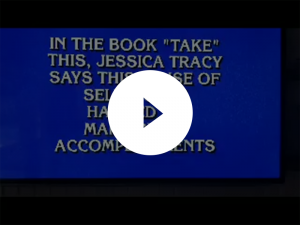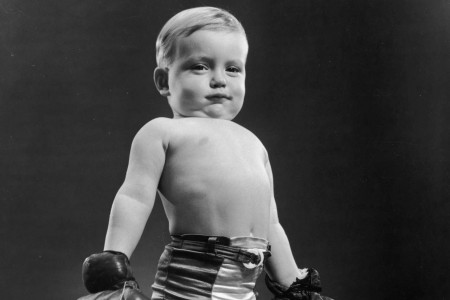Contents » + -
Media
2022 »
The Science of Envy in the Age of COVID-19
Jess was recently featured in an article published by the Globe and Mail where she outlines the utility of and differences between envy and jealousy. This article discusses the mechanisms behind social comparison as we move into a post-pandemic era, and whether envy and jealousy are helpful or detrimental to society.
Click the link to learn more about these emotions in the context of a pandemic!
2021 »
The Chicken and Egg of Pride and Social Rank
Jess, Eric, and Zak published a new blog post in the Society for Personality and Social Psychology's Character and Context Blog. In this post, they discuss the relationship between pride and social rank and their research investigating the causal direction of this association.
Check the post out in the link below!
The Feelings Lab Episode 2: Embarrassment

Check out Jess' feature on the second episode The Feelings Lab podcast, where she discusses the feeling of embarrassment alongside Dr. Alan Cowen, Dr. Dacher Keltner, Matt Forte, and Ali Kolbert!
2019 »
Taking ginger pills can make disgusting ideas more palatable.

Francesco Carta / Getty
By Sam Wong
We often say our sense of morality is guided by our gut feelings – and this may be truer than we realise. A set of experiments using the anti-nausea powers of ginger have provided the strongest evidence yet that bodily sensations play a key role in some of our moral judgements.
Previous studies have reported that the more disgusted people feel, the more wrong they judge moral infractions to be. However, it’s not clear whether feelings of disgust guide moral judgements, or if it …
Read the full article in the New Scientist here >>
PRIDE: STRENGTH OR SIN? THE IMPACT OF NONVERBAL DISPLAYS OF PRIDE ON HIRING DECISIONS
Picture this. You’re sitting in a job interview talking to someone who will help determine whether or not you get the job. They start asking you about something on your resume – a project you’re particularly proud of, one that you worked really hard on. You can’t help it: you start to lift your head a little higher, sit up straight, pull back your shoulders, puff out your chest. But will this nonverbal display o
f pride ac
tually help you get the job?
It might. At the University of British C
olumbia’s Emotion & Self Lab, Jessica Tracy studies nonverbal expressions of pride. Her research shows that displays of pride like these automatically communicate high status, and being perceived as high status by your interviewer could certainly help you get the job.
The Action-Unit Imposter Effect
A Facial-Action Imposter: How Head Tilt Infers Perception of Dominance From a Neutral Face
2018 »
Power posing might make people less willing to help you when asking for charitable donations
So-called “power posing” could backfire if you’re seeking a donation. New research in Evolution and Human Behavior indicates that expansive postural displays — like standing up straight with your shoulders pushed back — can dissuade charitable giving.
“We have studied nonverbal displays of pride and high rank in my lab for some time now (for example, see here, here, and here) and this is a topic covered heavily in my book, Pride: The Secret of Success,” said study author Jessica L. Tracy, a psychology professor at the University of British Columbia....
>> Read the full article in PsyPost here.
Do you discourage your kid from being prideful? Research shows that might not be the way to go.
...Parents know that grit and inner motivation are building blocks to success, yet they sometimes struggle with how to instill these qualities in their children. Recent research finds they have a surprising — and often overlooked — key ingredient: pride....
Read the full article in the Washington Post
Why Does Every Soccer Player Do This? Psychology Has the Answer.
Goals in soccer games can be few and far between, which helps explain the delirious nature of most scoring celebrations. Some players yank off their jerseys or drop to their knees and glide across the turf in glee. They all often end up at the bottom of a pile of jubilant teammates.
Then there are the players who are presented with a goal-scoring opportunity and, for whatever reason, fail.
with best prices today in the USA
When this happens, they all do the same thing: raise their hands and place them on their heads — apparently the universal gesture to signify, How in the world did I miss that?
...
The gesture signifies that “you know you messed up,” said
Jessica Tracy, a professor of psychology at the University of British Columbia. “It’s going to tell others, ‘I get it and I’m sorry, therefore you don’t have to kick me out of the group, you don’t have to kill me.’”
Read the full New York Times article here >>
Why We Shouldn't Be Too Modest
Pride is the downfall of many a tragic hero. Mr Darcy has to let his go before he can earn Elizabeth Bennet’s love. Dante listed it as one of the seven deadly sins. And as the famous (and oft-misquoted) verse from Proverbs cautions us, it “goeth before destruction, and a haughty spirit before a fall”.
There’s no question about it: we’re consistently told that pride makes us obnoxious at best and doomed at worst.
But pride may not entirely deserve this reputation as a destructive force. There’s new evidence that this emotion has an evolutionary function, and that it plays an important role in the way that we interact with the world....
Read the full article in BBC Future here >>
2017 »
How Nonverbal Displays of Power Influence Politics
Zak Witkower was recently interviewed about his work on nonverbal displays of power and how these behaviors can influence political outcomes. Check out this article in Vancouver Magazine, and Zak's live TV appearance on BC Global News.
The Art of Charm: Take Pride
Take Pride featured on The Art of Charm podcast
The Top 10 Insights from the Science of a Meaningful Life in 2016
Greater Good Science Center included our finding that humility has a dark side as one of the top 10 insights from the science of a meaningful life in 2016.
2016 »
Do Feelings Look the Same in Every Human Face?
Jess Tracy discusses the universality of emotion expressions in an article published in Greater Good Magazine.
Why Narcissism and Self-Esteem Aren't the Same Thing, According to Science
Healthy self-worth, or self-obsessed? There's a key difference you should know about, says Jessica Tracy, PhD, the author of Take Pride: Why the Deadliest Sin Holds the Secret to Human Success.
Get Yourself to Do Stuff by Appealing to Your Own Sense of Pride
A story at the start of Take Pride, a forthcoming book by University of British Columbia psychologist Jessica Tracy, is a typical one of youthful aimlessness, at least at first. Tracy writes about her post-college life in the late 1990s, when she moved across the country to San Francisco and got a job as a barista in a cozy cafe. It was a pleasant life, filled with lots of people to talk to and lots of time to read, along with few anxieties or responsibilities. But after about a year, she started missing something she’d had in college…
Are we proud of this article? Definitely.
Jess interviewed about Take Pride and Trump's hubris on Innovation Hub at NPR.
U.S. Presidential Campaign Offers a Study in Leadership Styles
For American voters and the rest of the world, the final weeks of the U.S presidential election campaign have become a spectacle to behold – or perhaps to turn away from.
For Jessica Tracy, a professor of psychology at the University of British Columbia, it’s a research opportunity like no other...
Why Pride is the Sin You Need to Succeed
Lust. Envy. Greed. Sloth. Anger. Gluttony. Those six deadly sins aren’t going to get you anywhere good—but the seventh just might. Pride is the sin you need to succeed, says Jessica Tracy in her new book Take Pride: Why the Deadliest Sin Holds the Secret to Human Success.
“There’s a misconception that pride is bad and should be avoided,” says the psych prof from University of British Columbia. “But it’s actually what motivates us and we wouldn’t be pushed to achieve without it.”...
Jessica Tracy
Outrageousness is Trump's trump card: Column
We don't like people who intimidate and belittle others, but we still give them power.
The Purpose of Human Pride: Why the 'Deadliest Sin' Holds the Key to Human Success
If we in the West consider ourselves highly evolved, why do we take so many blowhard politicians seriously, even when they’re spouting blatant untruths? In her search to uncover the evolutionary lineage—and potential social benefits—of pride, Tracy cites a study that shows five-year-olds will believe people who show self-belief and certainty, even when they’ve been proven wrong. Adults, when partially distracted, are just as gullible.
At a basic level, it seems, all of us are hard-wired to pay attention to people who display pride...
Talks at Google
Jess interviewed about Take Pride by Talks at Google
The 'Deadly Sin': The Positive and Negative Power of Pride
Jess interviewed about Take Pride on by Knowledge@Wharton, at the University of Pennsylvania
Donald Trump: A Case Study for Hubristic Pride
Jess interviewed about Take Pride and Trump's hubris on Tapestry, at CBC radio.
Taking Pride
Jess interviewed on All in the Mind on BBC radio.
The Power of Pride
Jess interviewed about Take Pride on Global News Morning Weekend
Why Pride is Good
It’s true that “hubristic pride” – when you feel pleased in your own abilities – can be
harmful and indicative of an inflated ego. But “authentic pride,” which is the satisfaction and pleasure we take from the positi
ve outcomes of our hard work and dedication, is an important, rewarding e
motion that encourages persistence. And for creatives going through a tough patch, feeling a lack of pride can be a useful indicator that you’re taking the wrong approach. In extreme cases, it might mean it’s time for you to change strategies, or even to take a new direction entirely...
The Power of Pride
Two Kinds of Pride
Jess interviewed about Take Pride on New Day Northwest, King 5 TV
Why Did People Vote for Donald Trump?
Nobody likes a bully. And yet, as exemplified by the recent US presidential election, bullies tend to accrue power.
Donald Trump got to the White House by angrily and aggressively attacking everyone who dared challenge him. He resorted to childish name-calling (“Little Marco,” “Crooked Hillary”), insulting women’s appearances, and mocking the disabled. Social and evolutionary psychology can help us understand why voters rewarded him for it...
Jessica Tracy on the Benefits of Pride
Take Pride featured on Curious Minds podcast.
The Science of Pride
Take Pride featured on Brainfluence podcast.
Pride as a Virtue
Take Pride featured on the Brian Lehrer Show on WNYC.
Exploring Pride, Confidence, and Success
Take Pride featured on Spark My Muse podcast.
Cheng, Tracy, Ho, & Henrich (2016)
Listen, Follow Me: Dynamic Vocal Signals of Dominance Predict Emergent Social Rank in Humans
Journal of Experimental Psychology: General, 145 (5), 536–547
Download PDFThis article has been featured on:
2013 »
Randles & Tracy (2013)
Shamed into taking a drink? Nonverbal displays of shame predict relapse and worsening health among recovering alcoholics.
Clinical Psychological Science
Download PDFThis article has been featured on:
Cheng, Tracy, Foulsham, Kingstone, & Henrich (2013).
Two ways to the top: Evidence that dominance and prestige are distinct yet viable avenues to social rank and influence
Journal of Personality and Social Psychology, 104, 103–125.
This article has been featured on:
2012 »
Ashton-James & Tracy (2012)
Pride and Prejudice: Feelings about the self influence judgments of others.
Personality and Social Psychology Bulletin, 38, 466-476.
Download PDFThis article has been featured on:
2011 »
Shariff & Tracy (2011)
What are emotion expressions for?
Current Directions in Psychological Science, 20, 395-399
This article has been featured on:
Tracy, Hart, & Martens (2011)
Death and science: The existential underpinnings of belief in intelligent design and discomfort with evolution.
PLoS ONE, 6, e17349.
Download PDFThis article has been featured on:
Tracy & Beall (2011)
Happy Guys Finish Last: The impact of emotion expressions on sexual attraction.
Emotion, doi: 10.1037/a0022902.
Download PDFThis article has been featured on:
Tracy and colleagues.
Coverage of our research on pride (2004-2011)
Our work on pride has been broadly featured on:
2008 »
Tracy & Matsumoto (2008)
The spontaneous display of pride and shame: Evidence for biologically innate nonverbal displays.
Proceedings of the National Academy of Sciences, 105, 11655-11660.
Download PDFThis article has been featured on:
2007 »
Tracy & Robins (2004; 2007)
Show Your Pride & Emerging Insights into the Nature and Function of Pride (2004; 2007)
Psychological Science and Current Directions in Psychological Science
This article has been featured on:


